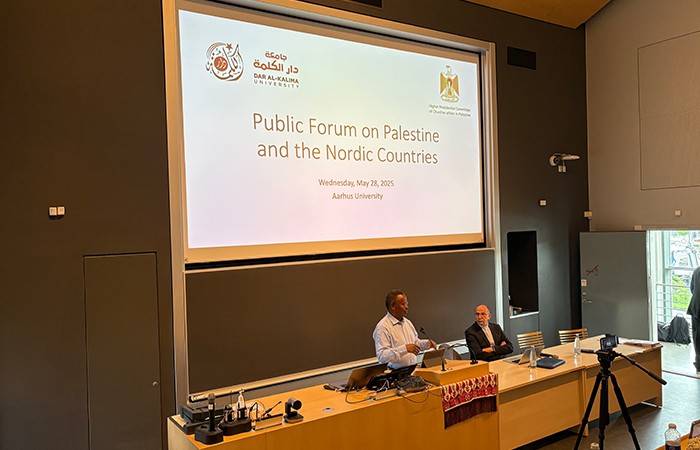Latest News
Winter Orientation Camp – DAK UC
Small groups of young women aged 16 or so wander around the college snapping photos of objects and people they see. Here, a beam of light captures a sculpture in the gallery. There, two students huddle over a text book. In a nearby room, one can hear another group of girls practicing increasingly complicated rhythms on their drums. The sound of the drum circle carries up the stairs into the art studio, where some girls sit and sketch a cluster of jars set in front of them. Their assistant, a young man from the Dar al-Kalima University College of Arts and Culture, strolls behind them surveying their work. You can’t smell it from here, but in the next building over in the Teaching Kitchen another group is laboring to put together sfeeha and kibbeh and malfouf.
Each of these girls is participating in a new kind of orientation camp, happening for the second time at Dar al-Kalima University College of Arts and Culture. The camp, run by Dar al-Kalima in partnership with Sports for Life and with funding from GIZ, seeks to build life skills and introduce the concept of post-secondary vocational training to the youth of Palestine. This group of girls comes from the villages surrounding Bethlehem, a historically underserved population. Although the camp advertised only 70 open spots for the four-day workshop, more than 100 girls asked to attend and were accepted, a strong testament to the growing desire for programs like this one.
Many of the girls are drawn in by the sports program in the morning, one of the camp’s leaders Narmeen Idrees explains. Each day begins with activities led by Sport for Life, which aims to provide healthy social and emotional development activities using sports as a tool. At first glance these activities appear to be simple sports games but really hold deeper meaning. Each activity, Idrees reveals, is designed to help the girls to build critical life skills such as leadership, time management, cooperation, and teamwork, as well as increasing their confidence. This style of hands-on learning and skill building is a key part of the camp’s popularity and efficacy.
After the morning sports activity, the girls split off into groups to attend their chosen arts workshop. A few weeks ago, surveys were sent to the girls’ schools, which helped them to determine which talents and passions they might have and which professions they might like to explore. On the first day in the camp, the girls were able to visit each of the four activities – photography, drawing and painting, music, and cooking – before making their final decision about which workshop in which to participate.
Each of the workshops is led by an instructor from Dar al-Kalima University College who is a professional in the field. Students from the college also serve as assistants and peer mentors, giving the girls a glimpse of what life at a vocational college could look like. This professional and peer support is absolutely critical, because in addition to building confidence and life skills, the camp also seeks to introduce the concept of vocational learning as a viable option for post-secondary education and employment. Many institutions in Palestine, including Dar al-Kalima University College of Arts and Culture, are moving towards a vocational model in order to train the significant portion of the Palestinian population under the age of 19 for future careers in fields such as tour guiding, cuisine, visual art, and IT. There is a growing demand for post-secondary education in Palestine, and institutions like Dar al-Kalima are a direct response to this demand.
Each day, the girls emerge with something to show for their work – a song they can now play on the piano, a bite of sfeeha, a new way to approach photography, a sketch. Chef Bassem, the leader of the cooking class, explains that this is his primary goal with the workshop. “I want them to learn basic things about the ingredients and the tools, to understand what they can do with them and have skills to approach them.” He uses these basic recipes to help build confidence – about the food and about their lives. The food, it should be noted, is delicious.
At the end of the four-day camp, the students created a presentation to show their parents. This presentation serves two primary purposes: first, it allows students to celebrate the work they have done over the course of the camp, demonstrating the new skills that they have acquired; second, it encourages parents to become engaged with their daughters’ learning and recognize the value of post-secondary vocational training. Parental support and approval is one of the most key factors in deciding whether and where to continue education after high school. Consequentially, involving the parents in the camp is a key part of the program’s mission.
This winter’s camp and celebration were an unmitigated success, despite chilly weather, frozen rain, and high winds forcing some to stay home. Nearly 100 girls were able to explore different career fields in which they might be interested and were introduced to a top of the line institution that can provide them with education.






